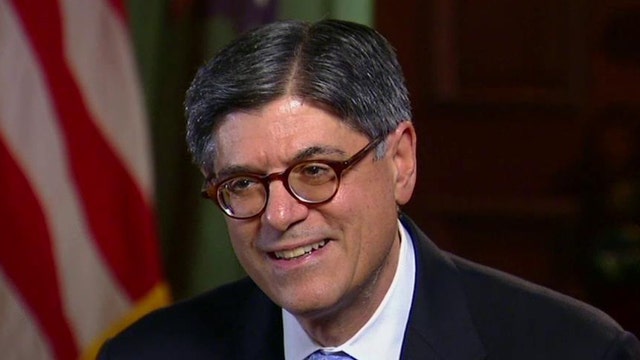Lew to Claman: A 'Terrible Time' for Debt Limit Fight
Treasury Secretary Jack Lew in an exclusive interview Thursday on FOX Business Network warned Congress against waiting until the last minute to approve raising the debt limit.
“The U.S. is seen as an island of strength in the global economy right now. This would be a terrible time to raise concerns about whether the U.S. has the ability to pay its bills and maintain its stability,” Lew told Liz Claman.
Lew sent a letter Thursday to Congressional leaders alerting them that the deadline for raising the debt limit had moved forward by two days to Nov. 3.
Lew said in the letter to Congress that additional information received by Treasury in the past two weeks regarding receipts, investments and expenditures revealed that Treasury’s projected net resources have declined by between $4 billion and $6 billion.
The debt limit, a once-obscure annual event in which Congress approves raising the U.S. limit on how much it can borrow in order to cover growing expenses and inflationary price increases, has become a huge political football in recent years.
Republicans concerned by the overall U.S. debt level have fought to tie approval of raising the debt limit to cutting spending elsewhere. Democrats have resisted the effort, saying a higher annual debt limit is necessary for the U.S. to consistently pay its debts and maintain its credit around the world. In both 2011 and 2013 political fights over raising the debt limit threatened to damage U.S. credit abroad had the U.S. been unable to pay its debts.
Lew said not raising the debt limit and forcing the U.S. to potentially miss payments on its debts would have a widespread negative impact on an already fragile global economy.
“I don’t think it was a very good experience the last time. We got right up to the edge, and, you know, we’re talking about a global economy that is -- is -- it’s an anxious time in the global economy,” Lew told Claman.
The U.S. economy could also be damaged if consumers and investors grow skittish at the threat of the U.S. losing its strong credit around the world.
“What we don’t need right now is to take an economy that’s now doing well, looked around the world as a source of strength, and do something that weakens it. That’s what would happen if Congress fails to act. Congress needs to act,” Lew said.
Claman, noting that companies such as Wal-Mart (NYSE:WMT) with large overseas operations have seen their quarterly earnings shrink significantly as the dollar has risen, asked if the Treasury Department might intervene at some point to weaken the value of the dollar.
Lew explained that one reason the U.S. dollar has gained value is because the U.S. economy is doing so much better than most other economies.
“Let’s be clear, what is going on in the global economy right now is that the U.S. economy, on a relative basis, is doing -- is performing more strongly than other economies. And that naturally leads to a stronger currency,” he said. “The answer is not for the U.S. economy to get weaker; it’s for the rest of the globe to do better, for demand around the world to increase. And this would work itself through.”
Lew said the Obama administration won’t tolerate unfair trade practices, such as other countries intentionally devaluing their currencies to improve their exports.
“What we can’t tolerate is we can’t tolerate if countries take steps to gain unfair advantage, to devalue their currencies, and we’re very aggressive pushing back on anything that looks like that,” he said.
Lew also said there had been no discussions of the U.S. bailing out debt-ridden Puerto Rico.




















